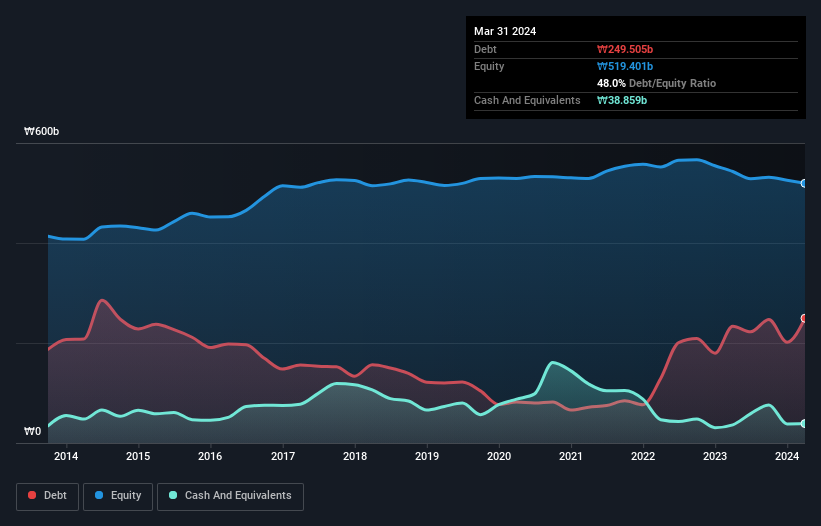- South Korea
- /
- Metals and Mining
- /
- KOSDAQ:A005160
Dongkuk Industries (KOSDAQ:005160) Is Making Moderate Use Of Debt
Warren Buffett famously said, 'Volatility is far from synonymous with risk.' So it might be obvious that you need to consider debt, when you think about how risky any given stock is, because too much debt can sink a company. As with many other companies Dongkuk Industries Co., Ltd. (KOSDAQ:005160) makes use of debt. But should shareholders be worried about its use of debt?
When Is Debt A Problem?
Generally speaking, debt only becomes a real problem when a company can't easily pay it off, either by raising capital or with its own cash flow. Ultimately, if the company can't fulfill its legal obligations to repay debt, shareholders could walk away with nothing. However, a more frequent (but still costly) occurrence is where a company must issue shares at bargain-basement prices, permanently diluting shareholders, just to shore up its balance sheet. Of course, debt can be an important tool in businesses, particularly capital heavy businesses. When we think about a company's use of debt, we first look at cash and debt together.
View our latest analysis for Dongkuk Industries
What Is Dongkuk Industries's Net Debt?
As you can see below, at the end of March 2024, Dongkuk Industries had ₩249.5b of debt, up from ₩233.4b a year ago. Click the image for more detail. However, because it has a cash reserve of ₩38.9b, its net debt is less, at about ₩210.6b.

How Healthy Is Dongkuk Industries' Balance Sheet?
We can see from the most recent balance sheet that Dongkuk Industries had liabilities of ₩383.7b falling due within a year, and liabilities of ₩56.9b due beyond that. Offsetting these obligations, it had cash of ₩38.9b as well as receivables valued at ₩156.4b due within 12 months. So its liabilities outweigh the sum of its cash and (near-term) receivables by ₩245.3b.
This is a mountain of leverage relative to its market capitalization of ₩301.4b. This suggests shareholders would be heavily diluted if the company needed to shore up its balance sheet in a hurry. When analysing debt levels, the balance sheet is the obvious place to start. But ultimately the future profitability of the business will decide if Dongkuk Industries can strengthen its balance sheet over time. So if you want to see what the professionals think, you might find this free report on analyst profit forecasts to be interesting.
In the last year Dongkuk Industries had a loss before interest and tax, and actually shrunk its revenue by 10%, to ₩744b. That's not what we would hope to see.
Caveat Emptor
While Dongkuk Industries's falling revenue is about as heartwarming as a wet blanket, arguably its earnings before interest and tax (EBIT) loss is even less appealing. Indeed, it lost ₩28b at the EBIT level. Considering that alongside the liabilities mentioned above does not give us much confidence that company should be using so much debt. So we think its balance sheet is a little strained, though not beyond repair. Another cause for caution is that is bled ₩41b in negative free cash flow over the last twelve months. So suffice it to say we consider the stock very risky. The balance sheet is clearly the area to focus on when you are analysing debt. But ultimately, every company can contain risks that exist outside of the balance sheet. These risks can be hard to spot. Every company has them, and we've spotted 2 warning signs for Dongkuk Industries you should know about.
Of course, if you're the type of investor who prefers buying stocks without the burden of debt, then don't hesitate to discover our exclusive list of net cash growth stocks, today.
New: Manage All Your Stock Portfolios in One Place
We've created the ultimate portfolio companion for stock investors, and it's free.
• Connect an unlimited number of Portfolios and see your total in one currency
• Be alerted to new Warning Signs or Risks via email or mobile
• Track the Fair Value of your stocks
Have feedback on this article? Concerned about the content? Get in touch with us directly. Alternatively, email editorial-team (at) simplywallst.com.
This article by Simply Wall St is general in nature. We provide commentary based on historical data and analyst forecasts only using an unbiased methodology and our articles are not intended to be financial advice. It does not constitute a recommendation to buy or sell any stock, and does not take account of your objectives, or your financial situation. We aim to bring you long-term focused analysis driven by fundamental data. Note that our analysis may not factor in the latest price-sensitive company announcements or qualitative material. Simply Wall St has no position in any stocks mentioned.
Have feedback on this article? Concerned about the content? Get in touch with us directly. Alternatively, email editorial-team@simplywallst.com
About KOSDAQ:A005160
Dongkuk Industries
Operates as a cold rolled steel company in South Korea and internationally.
Mediocre balance sheet second-rate dividend payer.
Market Insights
Community Narratives



